Why are Birmingham bin workers on strike?
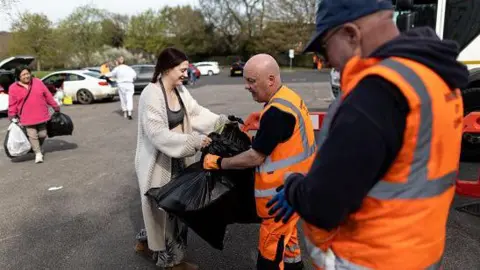 Getty Images
Getty ImagesMountains of rubbish heaped up on pavements and street corners have become a common sight in parts of Birmingham this year as the bin strike rumbles on, amid a dispute between the city council and the Unite union.
All-out strike action has been ongoing since March but, while the city's waste-strewn streets led to concerns for public health and queues of up to a mile at mobile collections, talks remained at a stalemate.
Months into the dispute, council leader John Cotton said the authority had "reached the absolute limit" of what it could offer.
But why are the strikes happening? Where can people take their rubbish in the meantime? And do residents still have to pay council tax?
What is the strike about?
The dispute initially centred on the council's decision to remove Waste Recycling and Collection Officer (WRCO) roles.
The union claimed about 170 affected workers face losing up to £8,000 a year because of the decision - but the council disputed the figures.
The local authority said the number of staff that could lose the maximum amount (just over £6,000) was 17 people and they would have pay protection for six months.
On-and-off strike action began on 6 January with 12 walkouts planned across four months, but the situation escalated and the union began an indefinite all-out strike on 11 March.
Unite also urged the council to guarantee long-term pay for Grade 4 bin lorry drivers as part of its briefings surrounding negotiations.
The union had claimed that, under new council plans, bin lorry drivers' pay could fall from £40,000 to £32,000.
The council said it was carrying out a "fair and transparent job evaluation process" to comply with equal pay laws.
Many bin lorry drivers came out on strike alongside other refuse staff.
What is the row about the WRCO role?
The union said the WRCO role was important because it brought safety expertise to an "often dirty and dangerous job", citing the death of a Coventry bin worker last year.
Unite believes removing the role leaves the rest of the workforce "without a fair path for pay progression".
The city council said the WRCO role was not industry-standard and did not exist in other councils.
The authority also said it was not a role that could be reinstated without opening the authority up to a potential equal pay liability.
The change, the council said, was part of a waste collection service restructure, that aimed to improve the service and comply with the Environmental Act 2021.
What does a major incident mean for the city?
Birmingham City Council declared a major incident on 31 March.
Such a declaration is when an event or situation, with a range of serious consequences, requires special arrangements to be carried out by one or more emergency responder agency/agencies, according to the Joint Emergency Service Interoperability Programme.
Birmingham's move to a major incident allowed it to increase the availability of street cleansing and fly-tipping removal, with an extra 35 vehicles and crews.
The council can also work with other organisations to better manage risks such as health and fire hazards - and increase sharing of data and intelligence.
The authority also said the move allowed officers to explore what further support was available from neighbouring authorities and government.
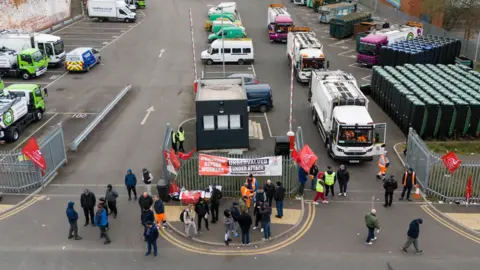 PA Media
PA MediaWhat stage are negotiations at?
Conciliation service Acas had mediated negotiations since May, but talks broke down, with council leader Cotton saying the authority was "walking away".
A ballot on 14 April had seen the 97% of Unite members who voted reject the latest offer.
The council previously said all staff were offered alternative employment at the same pay and almost three-quarters had taken up the offer or opted for voluntary redundancy.
As talks broke up, Cotton said the council had negotiated in good faith but the union had rejected all offers and the authority must now "press ahead to both address our equal pay risk and make much needed improvements to the waste service".
He also said it would mean waste service staff jobs would be axed, with voluntary redundancy options remaining on the table as well as "opportunities for training and redeployment across the council."
After the council said it would be consulting on the future of drivers' roles, Unite general secretary Sharon Graham claimed the council had resorted to a "fire and rehire" strategy.
She said bin workers were told to accept lower terms or be made redundant.
They have an industrial action mandate until December, Ms Graham added.
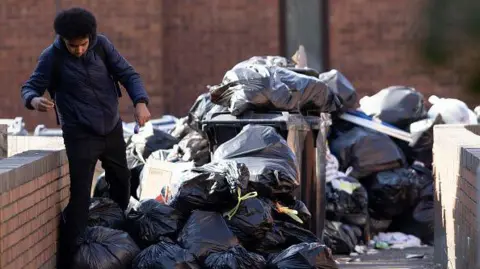 Getty Images
Getty ImagesWhat if your bin has not been emptied?
Throughout the dispute, Birmingham City Council advice to residents has been to put household waste out on normal collection days.
If it is not collected, it should be left out and will be collected as soon as the authority is able.
Recycling collections were suspended during the action so recycling bins should not be put out, the authority said.
Crews will collect "neatly bundled" side waste. Excess waste should be put in black bags, next to household waste bins.
The council also suggested residents could take waste to one of its five Household Recycling Centres but said, if that was not possible, residents should keep their recycling until the next opportunity.
There is an online system to report a missed collection.
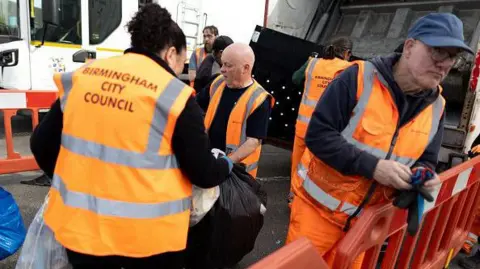 Getty Images
Getty ImagesBook a slot to use the tip
There are five Household Recycling Centres in Birmingham where residents can take refuse and recycling.
To attend four out of five of them, residents must book a slot.
They are:
- Kings Norton, Lifford Lane - open 10:00-22:00 Monday to Friday, and 08:00-18:00 on weekends
- Perry Barr, Holford Drive - open 07:00-21:00 Monday to Friday, and 08:00-18:00 on weekends
- Sutton Coldfield, Norris Way - open 07:00-21:00 Monday to Friday, and 08:00-18:00 on weekends
- Tyseley, James Road - open 07:00-21:00 Monday to Friday, and 08:00-18:00 on weekends
You can book no less than two hours before the time you would like to go to the centre and no more than three days before your visit.
You can book two visits at a time, which can be on the same day or week.
Proof of address must be shown upon arrival to confirm you live in Birmingham.
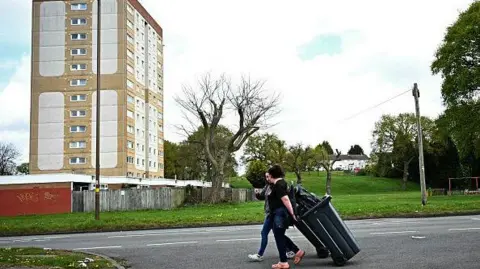 Getty Images
Getty ImagesHow do mobile collections work?
Birmingham City Council also has two Mobile Household Waste Centres (MHWCs) visiting all areas of the city.
They go to a location for the morning, from 07:30-13:00.
You can dispose of household general waste and bulky items at the MHWCs.
Waste from vans is not accepted and they have to book a slot at the Household Recycling Centres.
You can visit an MHWC as many times as you like. You do not need to book, bring ID or pay for the service.
The council updates the locations on its website.
Items accepted at MHWCs include household rubbish that cannot be reused and bulky items like toys, furniture and wood.
You are not permitted to take building materials, white goods, large items like garage doors or tree stumps and hazardous materials.
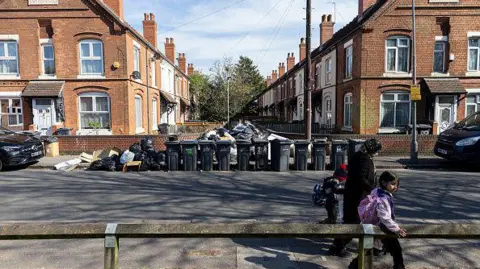 Getty Images
Getty ImagesDo residents still need to pay council tax?
Some residents who have paid thousands to hire skips to dispose of rubbish said they believed they should get a council tax rebate.
"It is a legal responsibility to pay council tax and we urge people to continue doing this," the city council said.
Tony Travers, a local government expert from the London School of Economics, said while refuse collection was important, it was one of a large number of services provided by the authority and the others were still being provided.
He added: "It's not lawful for people to withhold payments to the council for council tax. They are required by law to pay."
Those who have paid for a 2025 garden waste subscription service will be refunded automatically.
Follow BBC Birmingham on BBC Sounds, Facebook, X and Instagram.
